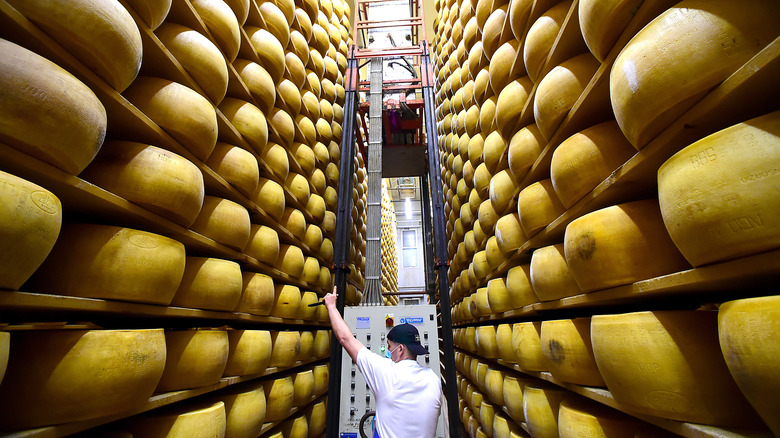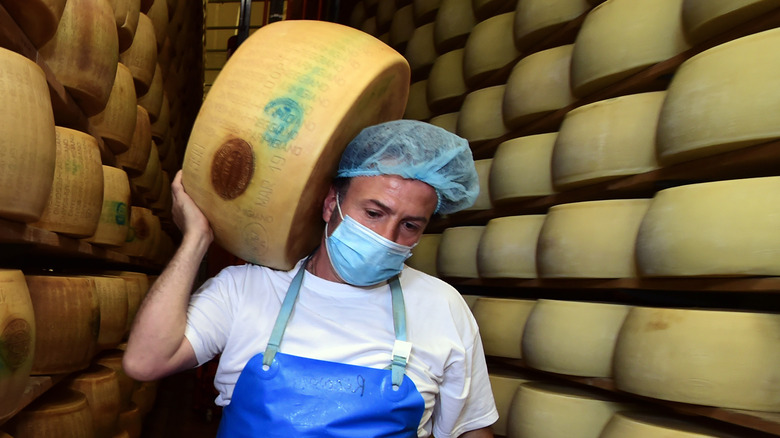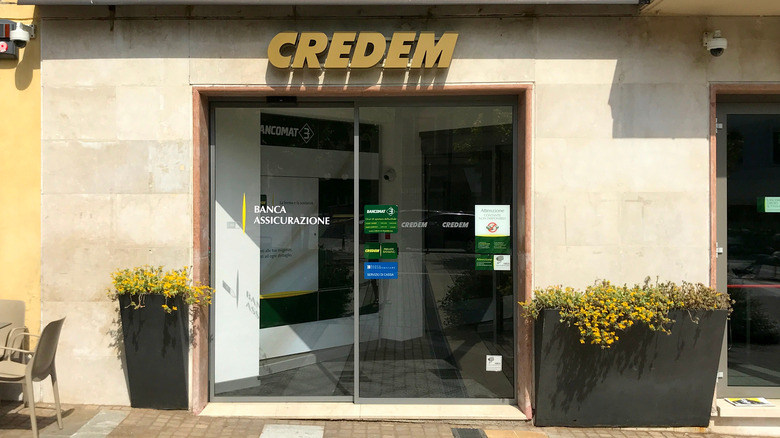This Bank In Italy Holds Almost Half A Million Wheels Of Cheese
There are many rules to Italian cooking, all of which are designed to protect the precious pasta and ingredients used in the dish. In Pasta Grannies, a documentary project filming Italian grandmothers performing the dying art of making pasta by hand, many of the recipes used are surprisingly simple. But it's often critical that the ingredients — whether olive oil, pine nuts for pesto, or cheese to garnish on top — are from Italy.
Per Eataly, the European Union actually has laws in place that formally designate products as authentically made in the local region the ingredient is from. This prevents the mass production of most U.S. supermarkets, where Italian shoppers are probably dismayed to find pre-shaved, powdered parmesan cheese that oddly seems to never expire. For example, the "DOP" label, standing for "Denominazione d'Origine Protetta" or "protected designation of origin," is applied to Parmigiano-Reggiano cheese to indicate that it was produced in one of four northeastern regions: Modena, Bologna, Mantua, or Parma (per Vine Pair). But food protections don't stop there; In the Emilia-Romagna region, located about 22 miles from the town of Parma, the Gringotts of Parmigiano-Reggiano ensures this precious cheese is stored securely.
The golden wheels of cheese
Credito Emiliano, or Credem for short, is a high-security bank where farmers in the region can deposit their cheeses to make sure they stay safe, per Vine Pair. In addition to laws requiring Parmigiano-Reggiano to originate from one of these northeastern regions, there are also cheese laws in place that require it to be curated in a certain way, with an aging process of between 18 and 36 months (via Vine Pair). Because of this long period of maturation, farmers can deposit their valuable cheese at Credem while it ages in exchange for loans (via Vine Pair).
According to Forbes, the Gringotts of cheese stores 440,000 giant wheels of Parmigiano-Reggiano, weighing in at 80 pounds a piece. Because many of the region's farms are still run by families who have been doing this for decades, rather than corporate, consolidated enterprises, many farmers don't have the space and delicate conditions the cheese requires to age properly on their land. Luckily, Credem offers a valuable resource for farmers to store and protect their products. According to a case study in Harvard Business Review, just 1% of cheese becomes devalued during its stay at the bank, compared to 10% of parmesan in other regions (via Forbes).
Worth more than a visit to space
The cheese in the bank — donned with infrared cameras, climate-controlled safes with alarms, and equipment in place to protect the cheese in the case of earthquakes — is altogether worth between 120 and 130 million euros, or $125.5 to $139 million, according to EuroNews. With each wheel of cheese worth about 400 euros or about $428, those security measures are necessary because thieves often target the bank to try and swindle away this precious commodity (via EuroNews).
Parmigiano-Reggiano, the so-called "King of Cheese," is safe from the threat of thieves and the threat of warm temperatures that make it sweat and lose its value in this bank. Roberto Frignani, who is in charge of making sure the temperatures and climate of the storage warehouses at the bank are just right, said in a video by Great Big Story that his job is to "protect the producer's investment, basically from cow to the bank." Suddenly, the grated powdered parmesan at the supermarket doesn't seem so appetizing.


